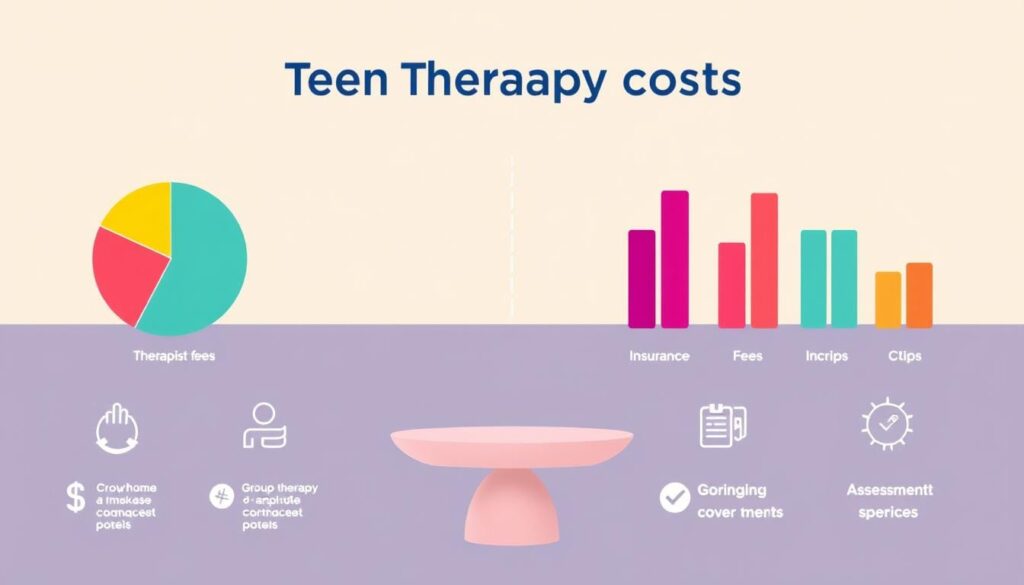Adolescence is a complex time, filled with emotional ups and downs. As a parent or teen, you might be looking for teen therapy near you. This search is for professional help to tackle the pressures of today’s world.
Adolescent counseling services are a vital lifeline for teens facing mental health issues. The teenage years are full of big emotional and psychological changes. Youth mental health support is key in helping young people grow strong and learn to cope.
In Los Angeles, areas like Silverlake and Los Feliz have teen therapy centers. These centers offer caring, customized help for adolescents. They provide safe places for teens to understand their feelings, boost their self-esteem, and learn to handle stress and relationships.
Key Takeaways
- Teen therapy offers professional support for emotional challenges
- Counseling helps address issues like isolation and academic stress
- Local therapy services provide personalized, age-appropriate interventions
- Therapy can improve communication and emotional regulation skills
- Professional support helps teens develop long-term mental wellness strategies
Understanding the Importance of Teen Therapy
Adolescence can be tough. Youth mental health support is a vital help for teens facing emotional and psychological issues. Therapy gives them a safe, private place to talk about their feelings and learn to cope.
Teenage anxiety help is more than just talking. Skilled therapists use proven methods to tackle mental health problems that can greatly affect a young person’s life.
How Therapy Benefits Adolescents
Therapy gives teens important tools for their mental health:
- Developing emotional intelligence and self-awareness
- Learning effective communication skills
- Building resilience and self-confidence
- Creating healthy coping mechanisms
“Early intervention is key in adolescent mental health,” says Dr. Sarah Martinez, child psychology expert.
Common Issues Addressed in Teen Depression Treatment
Teen depression treatment focuses on several key areas:
- Persistent feelings of sadness or hopelessness
- Social anxiety and isolation
- Academic performance challenges
- Family relationship difficulties
Studies show therapy can change lives. Held once a week, these sessions teach teens mindfulness, positive self-talk, and calm breathing. These skills boost their mental health.
The bond between the therapist and teen is key. Empowering teens to take part in their treatment leads to better results.
Types of Teen Therapy Options Available
Understanding mental health support for teens means knowing the different therapy types. Each one has its own benefits, fitting various needs and challenges of adolescents.

Individual Teen Therapy: Personalized Support
Individual teen therapy gives teens a special space to face their personal issues. It’s a one-on-one setting where teens can learn to cope, tackle emotional problems, and boost their self-confidence with expert help.
- Focused attention on personal mental health needs
- Confidential environment for open communication
- Customized treatment plans
Group Therapy Dynamics for Teens
Teen group counseling creates a supportive community. Here, teens can connect with others facing similar issues. It helps reduce feelings of loneliness and offers a chance for healing together.
“Shared experiences can be powerful catalysts for healing and growth.” – Mental Health Professional
Family Therapy for Adolescents
Family therapy aims to improve communication and solve family issues. It involves parents and siblings, tackling problems that affect a teen’s mental health.
| Therapy Type | Primary Focus | Key Benefits |
|---|---|---|
| Cognitive Behavioral Therapy (CBT) | Thought pattern modification | Anxiety and depression management |
| Dialectical Behavior Therapy (DBT) | Emotional regulation | Stress management and interpersonal skills |
Remember, finding the right therapy approach is a collaborative journey between the teen, therapist, and family.
Signs Your Teen May Need Therapy
It can be tough for parents and guardians to spot mental health issues in teens. The adolescent mental health signs are often small but very important. They show when a teen might need help from a professional.
Behavioral Changes to Watch For
Teen depression can show up in different ways. Some key signs include:
- Dramatic changes in sleep patterns
- Significant withdrawal from social activities
- Sudden drop in academic performance
- Increased irritability or unexpected anger outbursts
Emotional Indicators of Distress
Emotions can also show if a teen is struggling. Persistent feelings of sadness, hopelessness, or unexplained emotional numbness might mean they need counseling.
“Early intervention can transform a teenager’s mental health trajectory.” – Mental Health Professionals Association
Academic Struggles and Therapy
How well a teen does in school can tell a lot about their mental health. The CDC says more high school students feel hopeless. This shows they really need help.
| Academic Warning Signs | Potential Mental Health Implications |
|---|---|
| Declining grades | Possible depression or anxiety |
| Skipping classes | Potential social anxiety or emotional distress |
| Loss of motivation | Signs of burnout or depression |
Knowing these signs can help parents support their teen’s mental health.
How to Find Reputable Teen Therapists Near You
Finding teen counseling services can be tough for parents and teens. It’s important to look for local therapists with the right credentials.

- Use online directories
- Ask for recommendations
- Check therapist credentials
- Look at insurance coverage
Online Resources for Locating Therapists
Online platforms have changed how we find teen therapists. Sites like Psychology Today and Professional Counselor Directories list mental health experts for teens.
“The right therapist can make a transformative difference in a teenager’s mental health journey.”
Importance of Therapist Credentials
When looking for teen counseling, focus on therapists with training in teen mental health. Look for:
- Clinical psychologists with teen expertise
- Licensed professional counselors
- Child and adolescent psychiatrists
- Mental health nurse practitioners
Make sure to check for state licenses, special certifications, and experience with teens.
Your research will help you find a therapist who can support your teen’s mental health needs.
What to Expect During a Teen Therapy Session
Starting a teen therapy session can seem scary, but knowing what to expect can make you feel better. It’s a place where teens can talk about their feelings and grow. It’s a safe space for them to explore their emotions and challenges.
A typical teen therapy session aims to make you feel at ease. Teens can share their stories openly. The goal is to build trust and create a judgment-free zone.
Setting Realistic Expectations
Before your first session, remember that change takes time. It’s important to have realistic hopes for therapy. Here are some things to keep in mind:
- Sessions usually last 50-60 minutes
- The first few meetings are about getting to know the therapist
- Feeling comfortable will grow with each session
Common Therapeutic Techniques
Therapists use different methods based on what each teen needs. Some of the most helpful techniques include:
- Cognitive Behavioral Therapy (CBT)
- Dialectical Behavior Therapy (DBT)
- Interpersonal Therapy (IPT)
“Therapy is a journey of self-discovery and healing, not a quick fix.” – Mental Health Professional
To better understand therapy, here’s a look at what a session might be like:
| Session Component | Duration | Focus |
|---|---|---|
| Initial Assessment | 15-20 minutes | Understanding background and concerns |
| Discussion | 25-30 minutes | Exploring emotions and developing coping strategies |
| Reflection | 5-10 minutes | Summarizing insights and setting future goals |
Remember, every teen therapy session is unique, and the approach will be personalized to your specific needs and comfort level.
Benefits of Local Therapy Services for Teens
Adolescent mental health is complex and needs strong community support. Local teen therapy services are a vital lifeline for teens facing emotional challenges. With nearly 14 percent of teens experiencing major depressive episodes, getting counseling is key for their mental health.
Building a Strong Community Support Network
Your local community is crucial for teen mental health support. Accessible teen counseling offers immediate benefits. It creates a supportive space where teens can:
- Connect with trained local professionals
- Develop coping strategies tailored to community context
- Reduce feelings of isolation
- Receive personalized mental health guidance
Enhancing Mental Health Resource Accessibility
Community mental health support makes treatment easier to get. Only about 60 percent of teens with depression get professional help. Local therapy services can help by:
- Offering affordable counseling options
- Reducing transportation challenges
- Providing familiar, comfortable treatment environments
- Facilitating faster intervention
“Early intervention significantly improves long-term mental health outcomes for teens.” – Mental Health Experts
Investing in local teen therapy benefits can change how communities support adolescent mental health. It ensures young people get the care they need when they need it most.
The Role of Parents in Teen Therapy
Parental involvement in teen therapy is key for a teen’s mental health. Being a supportive parent can greatly help your teenager in counseling.
Supporting teens in counseling needs empathy, patience, and understanding. The American Academy of Pediatrics calls children’s mental health a national emergency. This shows how important it is for parents to support their teens.
Creating a Supportive Environment
Start by making a space where your teen feels safe and not judged. Here are some strategies:
- Avoid stigmatizing mental health challenges
- Validate your teen’s feelings and experiences
- Show genuine interest in their therapeutic process
- Respect their privacy while remaining engaged
“Therapy is not about fixing your child, but supporting their growth and understanding.” – Mental Health Professional
Effective Communication Strategies
How you talk about therapy matters a lot. Open, honest conversations build trust. Here are some tips:
- Ask open-ended questions about their feelings
- Listen without immediate judgment
- Acknowledge their courage in seeking help
- Offer support without overwhelming them
With over 25% of teenagers facing anxiety, your support can change their life. It helps them learn to cope and grow emotionally.
Navigating the Costs of Teen Therapy
Understanding the costs of teen therapy can be tough for many families. Mental health support is key, but it can be pricey. Luckily, there are ways to make affordable teen mental health services available for families.

Insurance Coverage for Adolescent Counseling
Figuring out insurance for teen counseling can be a challenge. Many health insurance plans cover mental health services. Here’s how to get the most from your benefits:
- Contact your insurance provider directly
- Verify specific mental health coverage details
- Request a list of in-network therapists
- Understand potential co-pay requirements
Alternative Payment Options
If insurance doesn’t cover all therapy costs, don’t worry. There are other ways to get teen mental health services:
| Payment Option | Average Cost | Benefits |
|---|---|---|
| Sliding Scale Fees | $40-$80 per session | Income-based pricing |
| Online Therapy Platforms | $65-$100 weekly | Flexible scheduling |
| Community Health Centers | $20-$50 per session | Low-cost mental health support |
“Investing in your teen’s mental health is invaluable, regardless of financial constraints.”
Looking into different options can help you find the best and most affordable teen therapy for your family.
Culturally Sensitive Approaches in Teen Therapy
Understanding each person’s background is key in mental health support. Culturally sensitive teen therapy looks at how culture affects mental health. It goes beyond just talking about feelings.
Research shows a big gap in mental health care. By 2021, some important facts were clear:
- 80% of therapists in the United States were white
- Only 5% of the psychology workforce identified as Black
- 94% of therapists were able-bodied
Importance of Diversity in Therapy
Multicultural counseling for teens creates a safe space. It lets young people feel truly understood. Therapists with cultural competence can:
- Validate individual experiences
- Address unique cultural challenges
- Provide personalized mental health support
Finding Therapists Who Understand Your Background
When looking for culturally sensitive teen therapy, here are some tips:
| Approach | Key Considerations |
|---|---|
| Language Preferences | Seek therapists offering multilingual services |
| Cultural Matching | Look for providers with similar cultural backgrounds |
| Specialized Directories | Use resources like Therapy for Black Girls or Octave |
“True healing happens when we feel seen, heard, and respected in our entire identity.”
Your teen deserves compassionate, culturally informed mental health support. This support should recognize their unique journey and perspective.
Signs of Progress in Teen Therapy
Watching teen therapy progress can be uplifting for both teens and their families. It takes patience and careful watching for small but important changes.

Teen therapy shows many positive changes. Teens start to feel better emotionally and get better at working with others.
Positive Changes in Behavior
Signs of teen therapy success include:
- Getting better at handling emotions
- Feeling less anxious and stressed
- Starting to enjoy personal activities
- Doing better in school
Improved Communication Skills
Getting better at talking is a big sign of success in teen therapy. Teens learn to:
- Share their feelings better
- Know when to say no
- Speak clearly and confidently
- Really listen to others
“Therapy isn’t about changing who you are, but discovering your strongest self.” – Mental Health Professional
Seeing teen therapy progress means noticing small but important steps. Each step is a big win for their mental health.
| Progress Indicator | Early Signs | Advanced Signs |
|---|---|---|
| Emotional Regulation | Recognizing triggers | Implementing coping strategies |
| Communication | Expressing basic feelings | Articulating complex emotions |
| Social Interaction | Increased comfort in groups | Building meaningful relationships |
Remember, every teen’s therapy journey is unique. Celebrate individual progress and maintain open communication with their therapist.
Online vs. In-Person Teen Therapy
Support for teens’ mental health has grown, with online and in-person therapy options. Teens now have many ways to get help, each with its own benefits.
Pros and Cons of Teletherapy for Adolescents
Teletherapy for teens has many good points:
- It’s easy to access from home
- It cuts down on travel issues
- It’s done in a place teens feel comfortable
- It offers more flexible times
But, online therapy also has some downsides:
- It can make it harder to read non-verbal cues
- It might face tech problems
- It can feel less personal
When to Choose In-Person Sessions
In-person therapy is key for some teens. Those with big emotional issues or who need hands-on help do better face-to-face.
| Online Therapy | In-Person Therapy |
|---|---|
| Good for mild to moderate problems | Best for serious mental health issues |
| Great for teens who are shy | Best for deep emotional work |
| More affordable | Offers more detailed therapy |
“The right therapy approach depends on individual needs and comfort levels.” – Mental Health Professional
When choosing between online and in-person therapy, think about what your teen needs. Talk to a professional to find the best fit for your teen’s mental health journey.
Overcoming Stigma Surrounding Teen Therapy

Mental health issues are big for teens. The National Institute of Mental Health says 4.1 million teens had major depression in 2020. This is 17% of all youth. Yet, many teens don’t get help because of stigma.
It’s important to understand and make teen therapy normal. Many teens are too ashamed or scared to talk about their feelings. This makes them feel alone.
Addressing Common Misconceptions
- Therapy is not a sign of weakness
- Mental health support is a proactive step toward wellness
- Professional counseling helps develop critical emotional skills
“Seeking help is an act of courage, not vulnerability”
Promoting Open Conversations
We need everyone to work together to help teens. Schools, parents, and communities should make safe places for teens to talk about their feelings. This way, they can get help without fear of being judged.
Here are ways to make teen therapy more normal:
- Educate students about mental health
- Share positive therapy stories
- Make counseling easy to find
Remember, therapy is a powerful tool for personal growth and emotional resilience.
Resources for Parents Seeking Teen Therapy
Dealing with teen mental health can be tough for parents. Finding good teen therapy resources and learning about teen counseling is key. It helps a lot in supporting your teen’s mental health.
Getting help from trusted resources for teen mental health can really help. The right info and support groups can change how you help your child with their mental health.
Recommended Books and Educational Materials
- *The Teen’s Guide to Social Media and Mental Health* by Dr. Lisa Damour
- *Untangled: Guiding Teenage Girls Through the Seven Transitions into Adulthood* by Dr. Judith Steinberg
- *Cognitive Behavioral Therapy: Techniques for Retraining Your Brain* by Jason M. Satterfield
Online and Local Support Resources
| Resource Type | Description | Contact Information |
|---|---|---|
| Open Path Collective | Directory of sliding-scale therapists | www.openpathcollective.org |
| National Suicide Prevention Lifeline | 24/7 Crisis Support | 1-800-273-TALK (8255) |
| TeenCounseling.com | Online therapy platform | $65-$100 per week |
“The most important thing is to keep the lines of communication open with your teen.” – Dr. Angela Karr, Child Psychologist
Remember, asking for help is a sign of strength. With the right resources and support, you can help your teen through tough times.
Emergency Resources for Teens in Crisis
Knowing the right teen crisis hotlines can be a lifeline in a mental health emergency. Youth suicide prevention resources are key for immediate support. The Suicide & Crisis Lifeline (988) offers 24/7 help for teens, connecting them with trained counselors.
The NAMI HelpLine provides free support nationwide for teens and families. The Trevor Project offers crisis help for LGBTQ young people. The National Sexual Assault Hotline (800-656-HOPE) provides free chat services for sexual assault support.
Local resources are also vital. Resolve Crisis Services (1-888-796-8226) offers immediate help in Allegheny County. Mobile crisis teams provide face-to-face support. If in danger, call 911 or text 988 for help.
National Hotlines and Text Lines
Emergency mental health services for teens are just a call or text away. The Suicide & Crisis Lifeline (988), The Trevor Project, and the National Sexual Assault Hotline offer confidential support. These hotlines provide immediate help for young people facing mental health challenges.
Local Emergency Services and Supports
Local crisis centers and mobile teams offer personalized support. Check your local county health services for teen mental health resources. Remember, seeking help is a sign of strength, and many support options are available to help you through tough times.

